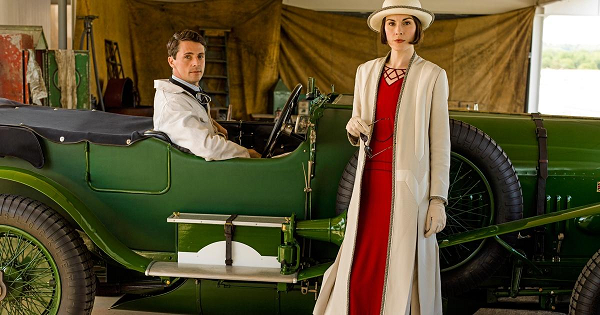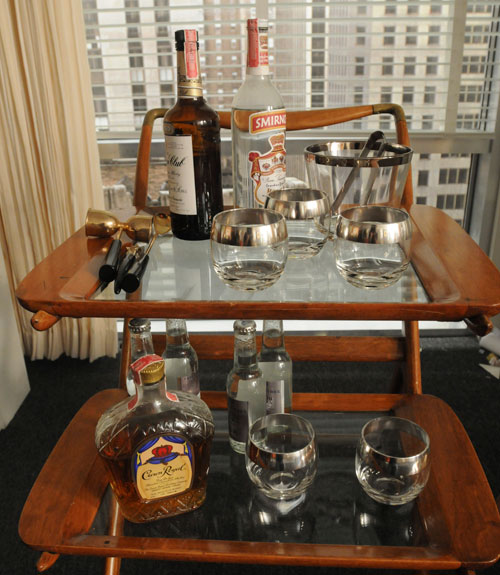We’ve recently been watching Mad Men (available on Amazon Prime with our AMC+ subscription), a TV show about New Yorkers in the advertising business in the 1960s. It clearly is attempting to paint a portrait of what life was like in that bygone era, and how social mores were so much different back then. For example, everyone is constantly lighting up cigarettes, in any context, even in front of kids. The men unabashedly treat women like sex objects, and the women just accept it and learn to navigate what today would be considered a hostile work environment.
I know that a major premise of the TV show is to highlight these social differences between then and now. How accurate this portrayal of the period is, I can’t be sure, since I wasn’t there, but it seems plausibly realistic to me. And the show certainly has high production values, beautiful art design, and fine performances, making it a delight to watch.
What truly amazes me about the lifestyle of these advertising guys (as depicted on this TV show) is their capacity for consuming alcoholic beverages. They keep liquor in their offices, and take any opportunity to have a finger or two of scotch. If one of your coworkers comes into your office at, say, 10:30AM, well – it would be rude not to offer them a drink! It’s a much different experience than I’ve had in my work life, which has occurred since our society moved on from the casual alcoholism of these Madison Avenue men.
For the duration of my young adult life, it would have been unthinkable to have alcohol in the workplace, or even to have a drink during the work day. It’s possible that this is because I spent those years living in the South of the United States, which while certainly known for its hard-drinkers, is also known for puritanical restrictions on public life. Maybe up in the big cities in the North, people were still having three martini lunches. But I suspect the real reason my work life was so different is my generational placement in history.
I do recall one early work experience which was like a glimpse of the last vestiges of the older generation’s casual work drinking. When I was a college student in the mid-1980s, I was in a work-study program, and worked at a major government agency in the DC area. The director of our department had an office suite that was behind a frosted glass window, so I never saw inside. One holiday season he opened up his suite for a company party, and lo and behold, he had a fully stocked dry bar in there. I even had a glass or two of something strong (I was 19 at the time, so I believe this was technically illegal), feeling a little bit guilty since I had to drive home afterwards. I was already internalizing the safety messages about drinking alcohol that were becoming predominant in the culture.
Logically, the director who presided over this dry bar would have been from the same generation as the “mad men” on the TV show, just twenty years older (since it was the 80s instead of the 60s). The way generations work, a cohort of people born about the same time tends to retain the same attitudes and behavioral patterns throughout the lives, bringing those patterns with them to older and older age brackets as time passes. This old timey office executive wasn’t going to give up his liquor, unless they pried it from his trembling fingers.
By the 90s and 00s, the tenor of public life had changed. America was in a social era in which the Baby Boomer generation – a profoundly moralistic generation – was entering midlife; while my generation, Generation X – an opportunistic but disorganized generation – was entering adulthood. Society became safety-obsessed and health-obsessed, and drinking on the job was counter to this new values focus. While my generation may have chafed under the emerging neo-Puritanical values regime, we weren’t about to collectively do anything about it. We would just deal with it.
A similar dynamic occurred in an earlier era: the Roaring ’20s, when Prohibition under the terms of the Eighteenth Amendment was in place. In that time the midlife generation was the moralistic Missionary generation, while the young adults were the free-wheeling Lost generation. Prohibition didn’t exactly stop drinking, but it did drive it underground.
The Eighteenth Amendment was repealed around the same time that the Great Depression started. In the new social era that emerged, the generation that came of age – the Greatest Generation – developed a reputation for collegial drinking and smoking. These behaviors became associated with recreational pleasure in a context of sociability and solidarity, never mind all the health problems they were destined to lead to down the road.
This pattern of casual drinking and smoking in public continued into the postwar era in which the Mad Men live(d), until further generational change led to a more health-conscious society, and those habits fell out of favor. So the cycle goes. The era of the executive with a ready a supply of liquor at the office came to an end.
During my young adulthood, drinking on the job became an underground activity, as during the Prohibition era. I say that because I do recall having a boss who was a bit emotionally unstable, in my opinion, and heard through the grapevine that he drank during the day. One time I found an empty bottle in a staircase, and took it at as sign that the rumors were true.
At a different job I had, there was a programmer who reputedly came to work drunk. His fate was to be sent to rehab; the company actually gave him a month off to clean up his act. I think they might have even paid for the rehab. He was really good at programming so I guess they couldn’t let him go. It just goes to show how much attitudes had shifted, and how drinking alcohol had become understood to be more of a pathology than a pastime.
Time has continued to pass, and I am no longer a young adult. Our society has recently gone through a financial crisis which can be likened to the 1929 stock market crash that was followed by the Great Depression. Has there also been a shift in attitudes towards drinking alcohol in the workplace, where it is now more acceptable as a social lubricant and source of conviviality, rather than being perceived as a personal moral failing?
I think so, at least to a limited degree, based on my experience in the workplace. In my recent positions, it has been common for the company to host parties where alcohol is served, sometimes but not always with a cap on the number of drinks per person. I’m not sure if age limits are enforced; it’s not impossible that an intern under the age of 21 has been able to sneak some drinks in. It isn’t exactly Mad Men, but it is an acceptance of drinking in the workplace, at least under controlled circumstances.
Media reports from the past decade or so have also suggested that this is happening, with the emergence a new kind of startup culture where drinks are a perk, available in the break room. Not that I’ve ever had the luck to work at a place like that, but then my startup days were during the dot com era, long ago.
That drinking at work may be on the rise makes sense in this social era. Instead of having moralizing Boomers in middle age, we now have practical Gen Xers, who will do whatever it takes to boost productivity and retain employees. Instead of having lone wolf Gen Xers in young adulthood, we now have sociable Millennials, who favor group activities, for which alcohol – since it lowers inhibitions and elevates mood, albeit temporarily – is a natural fit.
It must be noted, though, that the long term trend is that younger generations are drinking less than us oldsters did at the same age. The party days of my Gen X youth are in the past, and today’s youth are more cautious, and more conscious of their future. In fact, it’s those crazy Boomers who are drinking the most these days. That is the real story behind the controversy over the “woke” marketing campaign by Anheuser-Busch: a major corporation is desperately trying to generate sales among the young demographic, and finding that their only customers are uptight old farts. “Anti-woke” alcoholism is for a generation that is currently in its sunset years.
It’s probably for the best that, in the long term, we are drinking less as a society. The harmful effects of alcohol, such as the health problems it creates, and its contribution to car accidents and to domestic violence, outweigh its benefits. Prohibition might not have worked (no one likes to be told what and what not to do), but behavior can still change with time as beliefs and priorities change from generation to generation.
The question is, will this trend eventually reverse for future generations, in a future social era in which living for the present and taking chances with one’s health become fashionable once more? It’s hard to envision a completely alcohol-free future, given humanity’s long relationship with the pleasures and perils of consuming fermented beverages.


